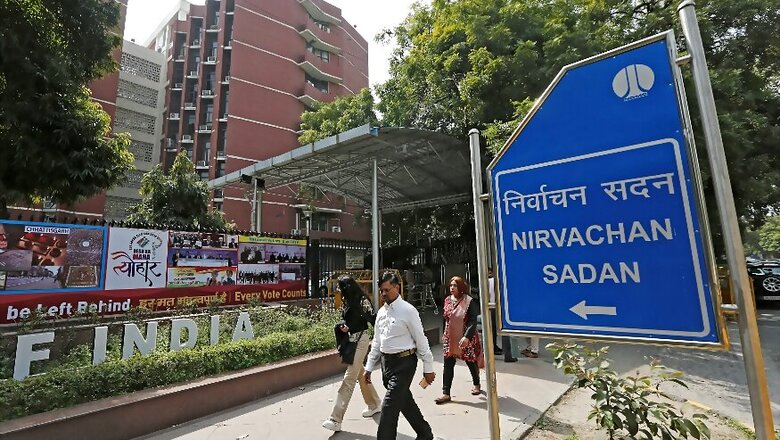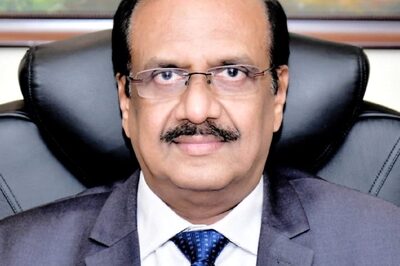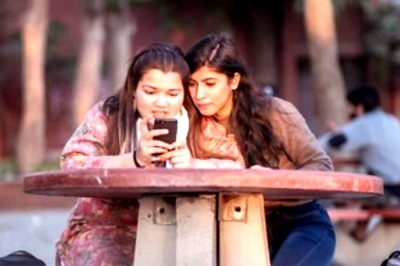Reprimand, Not Disqualify: Why EC Can Only Show Teeth But Not Bite in Face of Blatant Poll Violation

views
New Delhi: BJP leader Kapil Mishra's 'mini-Pakistan' comment on Shaheen Bagh did not go down well with the Election Commission (EC), which on Saturday banned him from campaigning for 48 hours. The Delhi Police also filed an FIR against Mishra at the behest of the poll body.
"Pakistan is entering through Shaheen Bagh, and mini-Pakistans are being created in Delhi," BJP's Model Town candidate had tweeted, drawing the EC ire.
However, as Delhi Assembly elections draw nearer, the question remains of how effective such measures become when election campaigns take a communal turn. While Mishra remained unapologetic despite being reprimanded by the poll body, former Chief Election Commissioner SY Quraishi termed it a "big and well-deserved punishment".
"An FIR means a criminal case due to which he (Mishra) will pay for a very long time. The 48-hour campaign ban is a pretty big punishment and a huge deterrent," Quraishi said. "Did he think he can get away with such irresponsible campaigning?" he added.
Mishra's comments amounted to violation of the model code of conduct (MCC) which forbids "aggravating differences or creating mutual hatred or causing tension between different communities".
However, this is not an isolated incident where political leaders have violated the MCC, which lays down the norms to ensure free and fair elections, to further their purposes.
Asked if this was the maximum punishment the poll body could have handed out and does it suffice, Quraishi said, "The Election Commission could have banned him for more number of days but in their judgment they must have thought this is proportionate to the offence. They must have considered this appropriate."
The model code of conduct came into existence in Februrary 1960, 10 years after the establishment of the Election Commission. First introduced by Kerala during the state Assembly elections, the MCC was circulated by the Election Commission to parties across the country in 1962. Nationwide political parties, political leaders, electoral candidates, government machinery, including departments and offices, government officers, and any institution that runs on public funds, were included under the ambit of the MCC.
Its non-statutory status has, however, often been put to question and the role of EC in handling the violations has come under the scanner.
Doubting the efficacy of the MCC, previous governments have attempted to amend the Representation of People Act, 1951 in order to make some violations of the model code of conduct illegal. However, the poll body has countered the demand, saying the purpose of code of conduct would be defeated as quick action against the violations cannot be expected if the matter goes to court.
Arguing the point, Quraishi said, "Everything that is included in the model code of conduct is also included in some Act or the other. When the Election Commission files an FIR against the offender, the results can take years to come. But the benefit of model code of conduct is that it has an immediate effect. That is why the Election Commission takes simultaneous action on both fronts."
To tackle the drawbacks, the MCC has been revised on several occasions. In its latest revision in 2014, the commission added guidelines with regard to the contents of the election manifestos, keeping in line with the orders of the Supreme Court in the S Subramaniam Balaji case.
The Election Commission, which ensures that the MCC is adhered to, has the power to advise or censure candidates, bar them from campaigning for certain period and recommend registration of cases against the offenders. Some of the cases that may incur EC action include canvassing for votes during a period when electioneering is barred, making official announcements while the MCC is in force, and making appeal to voters on sectarian grounds.
The poll body can also postpone elections to any constituency, cancel an already notified election or annul or abrogate an election already held.
The limitations to the powers of the poll body arise when it comes to disqualifying a candidate for electoral malpractices. It cannot disqualify a candidate or deregister any political party. Nevertheless, the Commission holds the final decision in the disqualification process once the matter has been raised and referred to it by the President of India or Governor. A candidate may incur disqualification if found to be holding an office of profit under the appropriate government, or has been declared an insolvent, or acquired the citizenship of a foreign state.
One case that stands out is that of the disqualification of Shiv Sena supremo Bal Thackeray, who was banned by the Election Commission in 1999, from casting his vote and contesting elections for six years with effect from 1995. The decision came in a 12-year-old case, where Thackeray was found guilty by the Supreme Court of delivering an inflammatory speech at a bypoll campaign rally in Mumbai in 1987.
The Election Commission of India derives it powers from the Article 324 of the Constitution, which says the superintendence, direction and control of all elections to Parliament, the State legislatures, and the offices of the President and Vice-President shall be vested in the EC. However, in the run up to the Lok Sabha elections in 2019, the poll body admitted to the Supreme Court that it was "toothless" saying that its powers were limited when it comes to communal and provocative speeches by candidates.
On the same day, it had imposed campaign bans on Bahujan Samaj Party supremo Mayawati, Uttar Pradesh Chief Minister Yogi Adityanath, Azam Khan of the Samajwadi Party and Maneka Gandhi of the BJP. But that was all it could do.



















Comments
0 comment